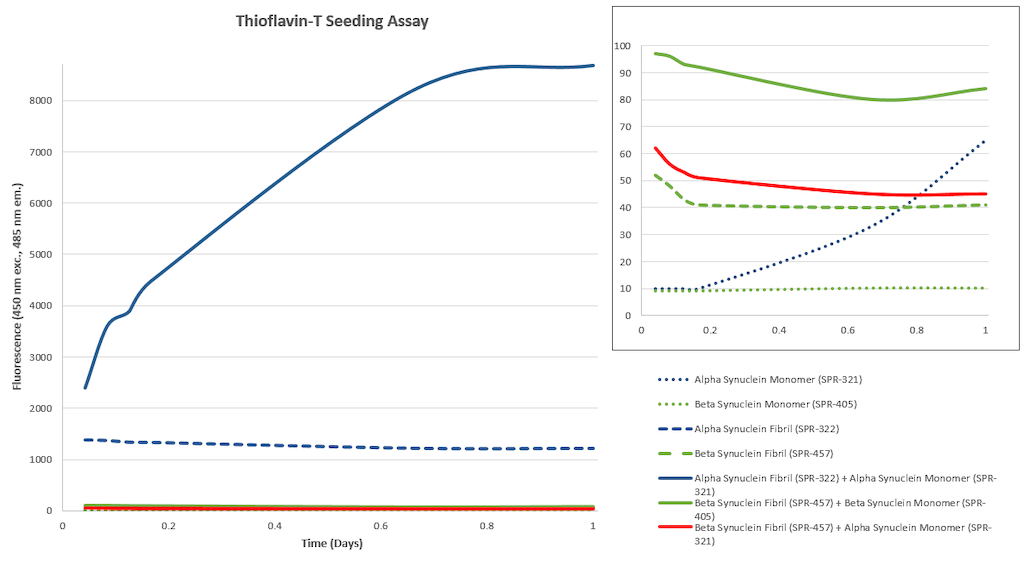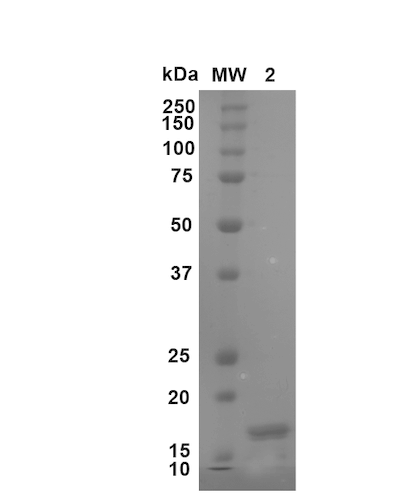SPR-405B SPR-405C SPR-405E
Scientist.com Supplier
Beta Synuclein Monomers
Stressmarq Biosciences
Image

Image

DESCRIPTION
Human Recombinant Beta Synuclein Protein Monomers
DETAILS
- Nature: Recombinant
- Purity: >95%
- Target: Beta Synuclein
- Category: Protein
- Conjugate: No tag
- References: 1. www.alz.org/alzheimers-dementia/facts-figures 2. Alzheimer, A. Über eine eigenartige Erkrankung der Hirnrinde. Allg. Z. Psychiatr. Psych.-Gerichtl. Med. 64, 146–148 (1907). 3. Taschenberger G., et al. (2013) Ann Neurol. 74(1): 109-118.
- Applications: WB | SDS-PAGE | In vivo assay | In vitro assay
- Field of Use: Not for use in humans. Not for use in diagnostics or therapeutics. For research use only.
- Protein Size: 14.28 kDa
- Purification: Ion-exchange Purified
- Concentration: 2 mg/ml
- Protein Length: Full length
- Research Areas: Neuroscience | Neurodegeneration | Alzheimer's Disease | Tangles & Tau | Neuroscience | Neurodegeneration | Parkinson's Disease | Synuclein
- Storage Buffer: PBS pH 7.4
- Alternative Names: 14 kDa brain-specific protein, Beta-synuclein Protein, Phosphoneuroprotein 14 Protein, PNP14 Protein, Sncb Protein, Synuclein beta Protein, SYUB_HUMAN Protein
- Cite This Product: Human Recombinant Beta Synuclein Protein (StressMarq Biosciences Inc., Victoria BC CANADA, Catalog # SPR-405B)
- Expression System: E. coli
- Species Full Name: Human
- Storage Temperature: -80ºC
- Shipping Temperature: Dry Ice. Shipping note: Product will be shipped separately from other products purchased in the same order.
- Cellular Localization: Cytoplasm
- Scientific Background: Alzheimer’s Disease (AD) is the most common neurodegenerative disease, affecting 10% of seniors over the age of 65 (1). It was named after Alois Alzheimer, a German scientist who discovered tangled bundles of fibrils where neurons had once been in the brain of a deceased patient in 1907 (2). Beta synuclein is abundant in neurofibrillary lesions of patients with Alzheimer's Disease. Beta synuclein is suggested to be an inhibitor of alpha synuclein aggregation- protecting the central nervous system from the neurotoxin effects of alpha synuclein (3).
- Certificate of Analysis: Certified >95% pure using SDS-PAGE analysis. Low endotoxin <5 EU/mL @ 2mg/mL.
Equivalent Items
| ... Loading